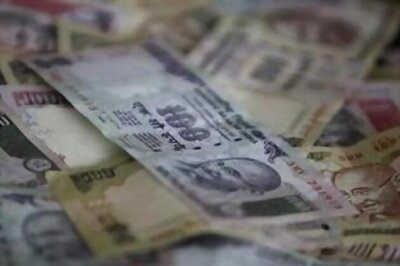
views
New Delhi: Churu, part of the Shekhawati belt in Northern Rajasthan that also comprises neighbouring Sikar and Jhunjhunu districts, has a sizeable Muslim population of 12.24 per cent. The 2011 Census places Muslim population in Churu and Ratannagar, two cities in the district, at 43.33 and 40.88 per cent respectively. Four other towns have a Muslim population 30 per cent.
Additionally, Churu district’s Dalit population, 22.1 per cent, is one of the highest in all the districts in Rajasthan. The Northern region of the state also has a considerable Jat population.
Despite such favourable social demographics, Congress has failed to win the Churu Lok Sabha seat in 20 years. The gateway to the Thar has been held by the Bharatiya Janata Party since 1999; in fact the seat has been held by one family.
A Jat leader from the BJP, Ram Singh Kaswan, was elected from the constituency thrice — 1999, 2004 and 2009. In 2014, with the ‘Modi wave’ in his sails, Kaswan’s son Rahul Kaswan was elected to Parliament from the seat. The BJP has once again fielded him from Churu seat, which goes to polls on May 6 — the fifth phase of the ongoing Lok Sabha elections — seeking re-election against Congress’ Rafique Mandelia, the only Muslim candidate from the two major national parties in the desert state.
Congress’ subpar performance in Churu becomes starker if you look at the Assembly elections in the state since 1999. The Churu parliamentary constituency comprises eight Assembly segments — Sadulpur, Taranagar, Sardarshahar, Churu, Ratangarh, Sujangarh, Nohar and Bhadra. In 2003 Assembly polls, Congress won three seats of the total eight Assembly segments in Churu; in 2008, it won only two. Five years later, the grand old party was reduced to a single Assembly seat in region.
The reasons for the Congress’ failure to organise support in Churu, however, go further back. According to Narayan Bareth, former BBC journalist and political analyst, prominent farmer leaders Daulatram Saran and Kumbharam Arya had considerable influence in Churu, a region that has been an epicenter of various farmer protests. “Saran and Arya were anti-Congress and they influenced Jats in the rural belt, pushing them away from Congress,” Bareth said. “In Urban areas, Jan Sangh — BJP’s precursor — had influence.”
Saran, born in Dhani-Panchera village in Churu district, started his political career as the general secretary and later president of Churu district Congress committee. Saran and Arya, who were part of the Congress governments in the state in 1957 and 1962, quit the party in 1966 and were later elected to the Parliament from Churu and Sikar Lok Sabha seats respectively on Janata Party tickets.
While Saran and Arya became influential, Congress too did not assert itself to strengthen its ideology and organization in the region, Bareth said. “Their existence (in Churu) was ad hoc,” he added.
On one hand, the Congress failed to put down roots in Churu, on the other, the BJP worked consistently to assimilate support. The saffron party installed Hari Shankar Bhabhra, an MLA from Ratangarh in Churu, as Deputy Chief Minister of Rajasthan in 1994. With his elevation, a sizable section of Brahmin voters in the region sided with the BJP. Rajendra Rathore, a six-time Legislator from Churu Assembly seat, brought the influential Rajputs in BJP’s kitty. And Ram Singh Kaswan, three-time Member of Parliament from Churu, wooed the Jats for the party. As Bareth puts it, the BJP planned it well.
Bhanwarlal Meghwal, a veteran Congress leader from the region and five-time MLA from Sujangarh since 1980, has different reasoning for Congress’ weak showing in Churu. For Meghwal, who serves as the Minister for Social Justice and Empowerment in the current Ashok Gehlot government in the state, it is all down to the candidate.
“Look, Congress’ Narendra Budania was MP for three terms — two of them consecutively — from Churu. In 1999, after serving two back-to-back terms as parliamentarian, he couldn’t win and BJP’s Ram Singh Kaswan took over,” Meghwal reasoned. “Then, in 2004 Congress fielded Balram Jakhar, but the opposition labeled him as an outsider and he could not get the votes. In 2009, Rafique Mandelia (who is contesting this time as well) was fielded. He actually lost by a very small margin of around 12,000 votes. Then in 2014, Congress fielded a weak candidate (Pratap Singh),” Meghwal said.
Pratap Singh, Congress’ 2014 Lok Sabha candidate from Churu, finished third with a vote share of 15.63 per cent, behind BJP’s Kaswan (52.63%) and BSP’s Abhinesh Maharshi (26.59%).
Mandelia, the Congress candidate in Churu this election, said the party did not put its faith in one candidate in Lok Sabha elections and hence was unsuccessful in the seat for 20 years. “The main reason is that the party kept changing its Churu candidate after losing. It has changed in every Lok Sabha election since 1999. I contested in 2009 and lost by a very small margin, but didn’t get a ticket in 2014,” Mandelia said. This, according to him, weakened five years’ worth of work in the field.
In state polls held in December last year, however, the grand old party’s fortunes in Churu turned. Congress went from winning one Assembly segment in Churu Lok Sabha constituency in 2013 to five in 2018. Congress emerged victorious in Sadulpur, Taranagar, Sardarshahar, Sujangarh and Nohar; CPI(M) managed to win Bhadra; and BJP were reduced to just two seats: Ratannagar and Churu. In the latter, BJP’s Rajendra Rathore, a five-time MP from the seat previously, won by a whisker, beating Congress’ Mandelia by a margin of 1,850 votes.
The results were in line with the massive anti-incumbency against the Vasundhara Raje government in the state. “The farmer movement in neighboring Sikar also impacted polling in Churu. Churu’s farmers had participated in the protests,” Bareth said.
Congress, on the back of its 2018 state election showing in Churu Assembly segments, is confident of its chances in the region and is hoping for the Schedule Caste and minority votes to consolidate in its favour. “Mandelia is in a good position this time,” Meghwal said. “I think it is a close contest.”
Churu, however, remains a big challenge for Congress. Prime Minister Narendra Modi did his first sabha in Churu this election season. According to Bareth, the BJP slogan of ‘Modi tujhse bair nahi, Raje teri khair nahi’ also resonated with people in the region. “That slogan was aimed to contain anti-incumbency against the centre, or divert anti-incumbency toward Raje. Vote against Vasundhara, but when the time comes, vote for Modi. That slogan has helped BJP,” Bareth said.
Churu also has a sizable number of ex-army men and BJP’s nationalism pitch has gone down well in the parts.
But, Mandelia believes all communities in Churu will vote for him. The Congress cadre is strong this time as well, he said. From party leaders to party workers, all have worked in unison. The Assembly polls result should also impact the mood of voters, he believes. “For sure, things will be different,” Mandelia said. “The people supported me fully in 2009 too. I feel, this time, Churu belongs to Congress.”


















Comments
0 comment